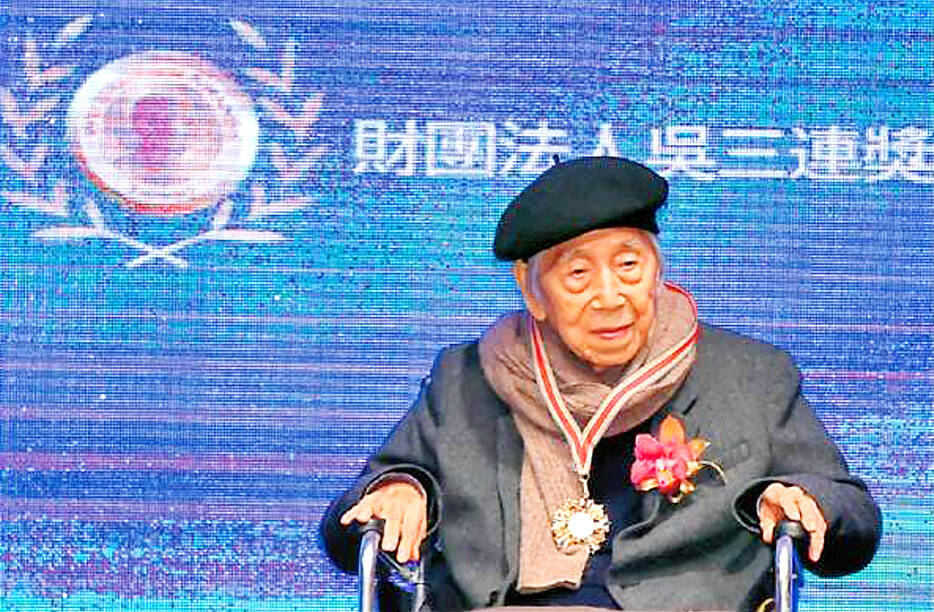Acclaimed Taiwanese poet and writer Lin Heng-tai (林亨泰) died on Saturday at the age of 98, the Ministry of Culture said yesterday, adding that it would submit a request for Lin to be honored with a posthumous presidential citation.
Born in 1924 in Beidou County, Taichung Prefecture — which is now known as Changhua County — during the Japanese colonial era, Lin was best known for modern vernacular-style poetry, the ministry said in a statement.
Using the pen names Hen-jen (亨人) and Huan-tai (桓太), Lin was affiliated with several literary organizations, including the Silver Bell Society (銀鈴會), Modernism (現代派), the Li Poetry Society (笠詩社), Taiwan PEN (台灣筆會) and others, the ministry said.

Photo: Taipei Times
In 1949, he published his first poetry collection called The First Cry of the Soul (靈魂的產聲), and in 1956, he became part of the “Modern School” led by poet Ji Xian (紀弦).
Eight years later, he cofounded the Li Poetry Society with literary friends and served as the first editor-in-chief of the Li Poetry (笠詩刊) magazine.
Modern poetry was Lin’s primary genre, the ministry said, adding that, from the release of his first poetry collection in 1949 to Poetry of Life (生命之詩) in 2009, Lin was active for six decades.
He also authored such works as The Long Throat (長的咽喉), Collected Poems of Lin Heng-tai (林亨泰詩集) and The Unbeatable History (跨不過的歷史), and translated An Introduction to the Method of Paul Valery.
Lin received numerous awards throughout his career, including the Oxford Prize for Taiwanese Writers, the Wu San-lien Literary Award and the National Award for Arts, the ministry said.
Minister of Culture Shih Che (史哲) said that Lin was a poet and writer who held a prominent position among the “translingual generation” of writers in Taiwan.
Lin was leaving behind a priceless legacy and a profound example for generations to come, Shih said.

Three Taiwanese airlines have prohibited passengers from packing Bluetooth earbuds and their charger cases in checked luggage. EVA Air and Uni Air said that Bluetooth earbuds and charger cases are categorized as portable electronic devices, which should be switched off if they are placed in checked luggage based on international aviation safety regulations. They must not be in standby or sleep mode. However, as charging would continue when earbuds are placed in the charger cases, which would contravene international aviation regulations, their cases must be carried as hand luggage, they said. Tigerair Taiwan said that earbud charger cases are equipped

Foreign travelers entering Taiwan on a short layover via Taiwan Taoyuan International Airport are receiving NT$600 gift vouchers from yesterday, the Tourism Administration said, adding that it hopes the incentive would boost tourism consumption at the airport. The program, which allows travelers holding non-Taiwan passports who enter the country during a layover of up to 24 hours to claim a voucher, aims to promote attractions at the airport, the agency said in a statement on Friday. To participate, travelers must sign up on the campaign Web site, the agency said. They can then present their passport and boarding pass for their connecting international

WEATHER Typhoon forming: CWA A tropical depression is expected to form into a typhoon as early as today, the Central Weather Administration (CWA) said yesterday, adding that the storm’s path remains uncertain. Before the weekend, it would move toward the Philippines, the agency said. Some time around Monday next week, it might reach a turning point, either veering north toward waters east of Taiwan or continuing westward across the Philippines, the CWA said. Meanwhile, the eye of Typhoon Kalmaegi was 1,310km south-southeast of Oluanpi (鵝鑾鼻), Taiwan’s southernmost point, as of 2am yesterday, it said. The storm is forecast to move through central

Taiwan sweltered through its hottest October on record, the Central Weather Administration (CWA) said yesterday, the latest in a string of global temperature records. The main island endured its highest average temperature since 1950, CWA forecaster Liu Pei-teng said. Temperatures the world over have soared in recent years as human-induced climate change contributes to ever more erratic weather patterns. Taiwan’s average temperature was 27.381°C as of Thursday, Liu said. Liu said the average could slip 0.1°C by the end of yesterday, but it would still be higher than the previous record of 27.009°C in 2016. "The temperature only started lowering around Oct. 18 or 19